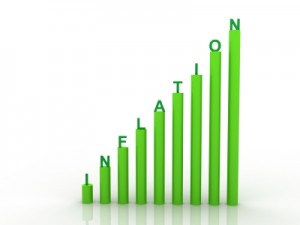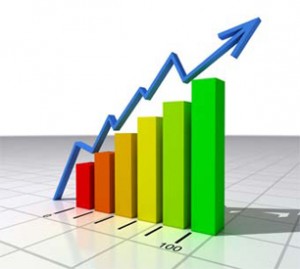Inflation is a hot topic in Indian political circles these days,but what is inflation? Inflation is a rise in price of all goods and commodities in an economy. So why is inflation public enemy number one? Because inflation brings with depreciation in the value of rupee. So if people before paid some amount as value for a particular amount of product, they now have to pay more for the same amount during inflation.So what causes inflation?There are three reasons:-i)Input Cost inflation ii) Deficient supply inflation iii) Excess Money Supply inflation.
i)Input cost inflation-These days, the cost of factors of production has increased either due to scarcity or lack of good quality factors of production.Therefore producers of a good are forced to raise the price of there finished goods to meet there production cost .
ii)Deficient supply inflation-The second case is when demand for a good increases because of increase in standard of living or increase in income of people. These days majority of Indians can afford to buy things like mobile phones and laptops that was not possible decayed before . But if demand increases,for price equilibrium to remain the same ,supply must increase as well. When supply doesn’t catch up with demand,inflation is the result.
iii)Excess money supply inflation-When the government of any country prints too much of money to meet there dead requirements/deficit budget. These means more currency rotates in the economy and value of currency falls leading to inflation.
So is inflation necessarily bad? No,inflation at low ideal rate of two percent or 3.4% (for India) is beneficial ,as it means producers or suppliers get there worth from production or sales thus encouraging investment in the country. A small inflation rate is an indicator of a growing economy.But the current inflation rate of 6% is dangerous. So what steps can be taken to cut down inflation rate? i)Encourage investment within the country ,so supply of commodities can match demand. ii)Reduce purchasing power of people by selling securities to the public ,curbing practices wherein banks are allowed to give loans without restrictions to the customers ,increasing bank rates(twin effect of causing depositors to save more in banks and lenders are discouraged to us for a high loan amount with the high rate of interest) and increase in taxes. All this measures reduce consumption expenditure and demands of the people. iii)Other measures include controlling government expenditure to reduce more reasons for borrowing and printing excess money. Also postponing repayment of public debt until a long time to reduce purchasing power of public by the government helps in this regard.
Click here for government certification in Accounting, Banking & Finance





4 Comments. Leave new
Good effort!
Good article..
Nice!
nice…